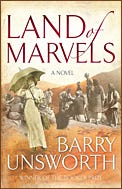The land of marvels is Mesopotamia, now Iraq, home to many great empires over the centuries. It’s also home to vast reserves of oil, a commodity suddenly in great demand in 1914, as the oppressive shadow of war looms inevitably nearer.
This means nothing to British archaeologist John Somerville, striving to emulate his hero Henry Layard, the man who rediscovered Nineveh, fabled city of the Assyrian Empire. After three disappointing years, it appears that his hopes of a major find are about to be realised.
Somerville’s hopes are of no consequence to the movers and shakers of the world. Forget the past: the way ahead, it seems, lies in oil. Germans, Britons and Americans make secret deals, scrambling to set up complex consortiums in order to extract maximum future profit.
While Somerville digs obsessively, his outpost at Tell Erdek takes on the aspect of a farcical Edwardian house-party, with many of the guests not quite what they seem. Swedish missionaries, devious geologists searching for oil, and predatory secret agents mingle as they await a chance to outwit each other. Tension builds steadily.
Land of Marvels is a subtle, multi-layered novel, full of rich irony; a deceptively simple story which, like a good coffee, needs time to percolate before its full flavour can be appreciated. Its moral is that history is doomed to repeat itself and that transience is the very nature of power. It’s no coincidence that it is set during the rise of the great world-wide multi-national empires based on oil consumption and was written as their time in the sun fast runs out. Unsworth chose these prescient words from Kipling’s hymn to the British Empire as an epigraph:
Far-called our navies melt away;
On dune and headland sinks the fire:
Lo, all our pomp of yesterday
Is one with Nineveh and Tyre!
(2009, 304 pages)



